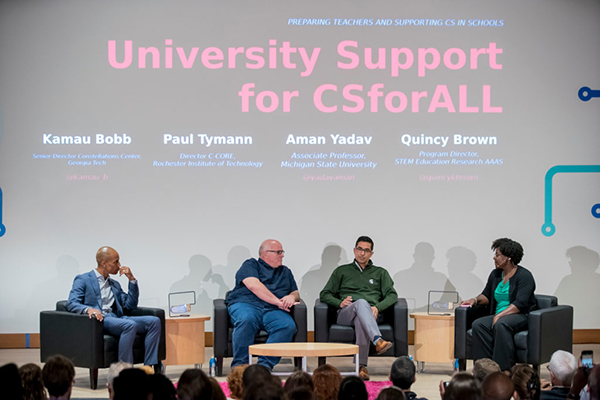A commitment to K-12 computer science
Washington University’s Engineering school helped to stage a two-day CSforAll summit as part of its continuing commitment to providing computer science to all students

Computers are an essential, everyday part of all of life. Understanding the science behind them is a vital skill for any student. However, many K-12 students — especially those in rural or underserved districts — lack access to a computer science curriculum. It’s an important gap to fill; currently, an estimated half-million tech jobs are unfulfilled across the United States and, by next year, 51 percent of all STEM jobs are expected to be in computer science-related fields.
That’s why Washington University in St. Louis recently served as host and co-sponsor for a national summit dedicated to expanding computer science (CS) courses for all students. The CSforAll Summit took place on the Danforth Campus Oct. 16-17 and attracted around 300 teachers and administrators from school districts across Missouri and southern Illinois to provide them the tools to incorporate computer science into all aspects of the curriculum beyond computer science classes.
On the summit’s second day, more than 400 leaders from such corporate giants as Apple Inc., Facebook, Cartoon Network, Emerson, Monsanto Corp., and The Boeing Co., and organizations including GlobalHack, Girls Scouts of the USA and CodeHS, all came together to commit funds to help the initiative move forward. The initiative also has the support of universities in the region, including Washington University, Saint Louis University, University of Missouri-St. Louis, Southern Illinois University-Edwardsville, Maryville University and Harris-Stowe State University.
Washington University’s School of Engineering & Applied Science helped to stage the event as part of its continuing commitment to providing computer science to all students.
“At WashU, we now teach coding to the majority of the university, that’s not just STEM majors and computer science majors,” said Aaron Bobick, dean of the School of Engineering & Applied Science and the James M. McKelvey Professor. “We use the same course for everyone, you just have to make it interesting and accessible. Everybody knows the world needs more computer scientists, and I love the idea that we’re now teaching the way you need to think when you think about computing all the way down to elementary schools.”
CSforAll was first organized last year as part of President Barack Obama’s science education initiative, and continues to grow. Hundreds of people attended the two-day summit, which included intensive educator workshops designed to give districts the tools needed to jump-start CS curriculum. The summit also contained an exhibit hall, guest speakers, panel discussions and a series of announcements from corporate partners, including Apple, Dell and Microsoft, pledging their support to the national movement.
“In today’s digital economy, computation is fundamental to creativity, productivity and ingenuity in every discipline, and in everything that one might want to do,” said Provost Holden Thorp. “The continued relevance and strength of our education system requires integrating computing literacy into every curriculum even as much as reading and mathematics.”
In all, more than 170 organizations announced new commitments to the CSforAll movement during the summit.
Back to News